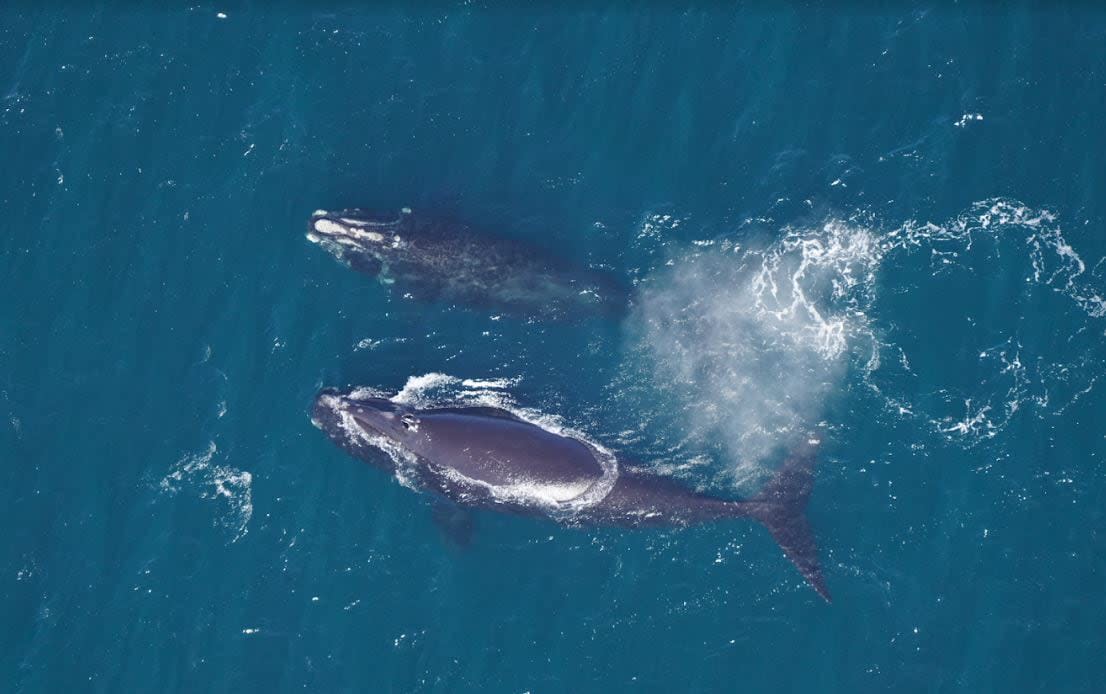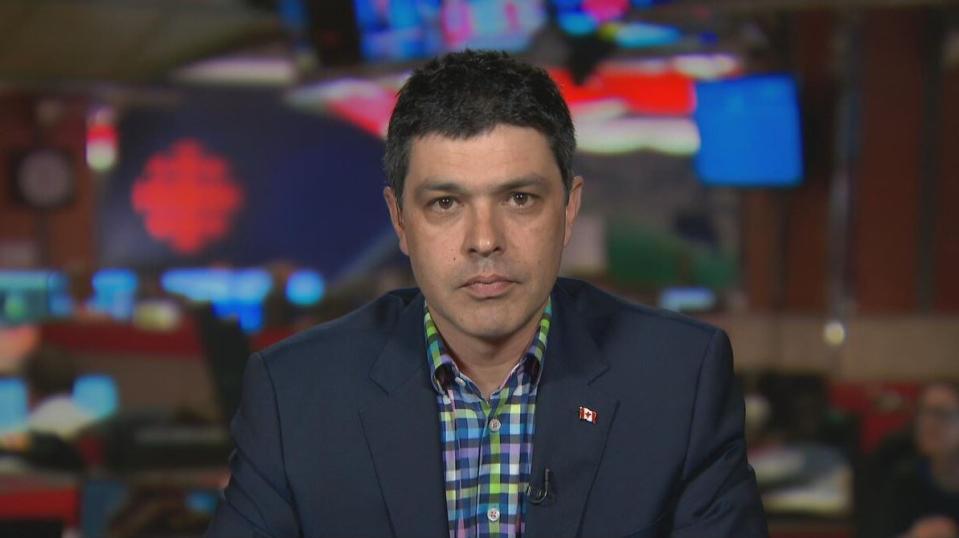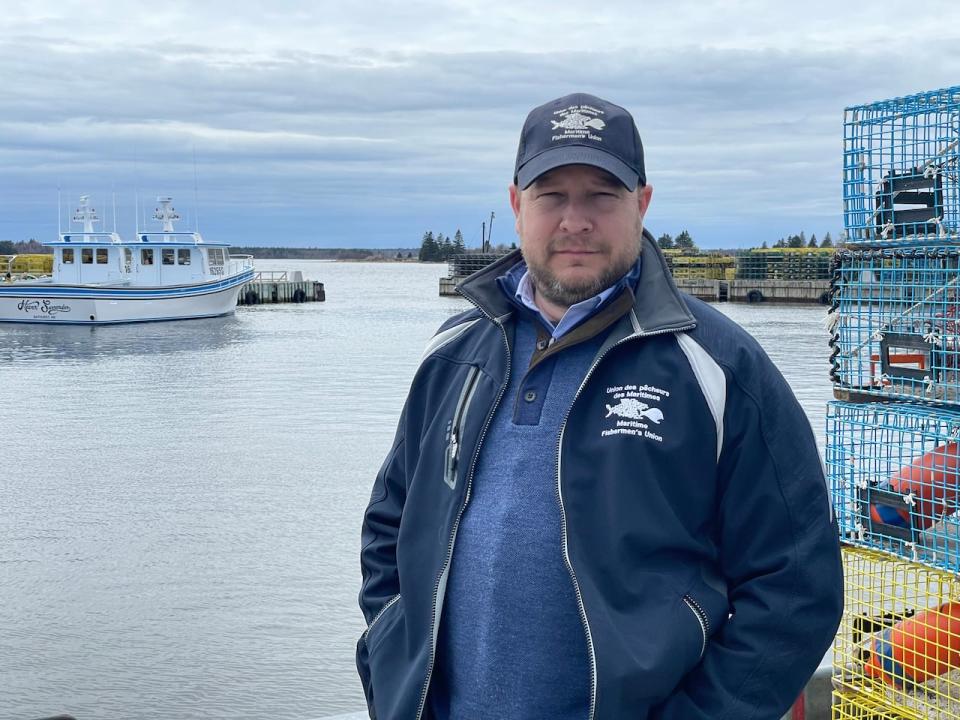N.B. Liberal MP calls for loosened right whale protection measures to help fishermen

A northeast New Brunswick Liberal MP is joining the Maritime Fishermen's Union in calling for a better balance between protecting endangered North Atlantic right whales and allowing commercial fishing operations.
Acadie-Bathurst MP, Serge Cormier, criticized his government for extensive closures of fishing zones that he warned could result in "disastrous consequences" and economic losses of $25 to 30 million dollars.
"While we are trying to save an endangered species, these extreme measures are actually endangering our fishing industry and coastal communities," Cormier said in a statement released Thursday.
"I can no longer defend my government on this issue. I stand with the fishermen, the lobster and crab industry, the factory owners and workers, and the community members."
Cormier's comments come less than a week after Fisheries and Oceans Canada announced a temporary shutdown of part of the Gulf of St. Lawrence to non-tended, fixed-gear fishing after the sighting of an entangled North Atlantic right whale.
The affected fishing zone, closed for 15 days, stretches across much of New Brunswick's Acadian Peninsula.
Earlier sightings of North Atlantic right whales have also resulted in impacts on the snow crab fishery.
While snow crab fishermen can relocate to another area, lobster fishermen are unable to move their traps.
Coastal communities 'at risk'
Cormier said the recent closure on the Acadian Peninsula affects between 200 and 250 fishermen, who have four days to get 60,000 traps out of the water with no other territory to relocate to.
In an interview with Radio-Canada on Sunday, he said entire communities will "suffer the consequences," as dock workers are off the job, processing plants lose revenue, and factory workers log fewer hours to qualify for employment insurance.
"We cannot just protect a species but not protect the communities," he said.
"We cannot put our communities, our people, at risk either."

Acadie-Bathurst MP Serge Cormier said he can no longer defend his government's measures to protect right whales, due to the effects on New Brunswick's fishing industry. (Radio-Canada)
Cormier said he is calling on the Minister of Fisheries and Oceans Diane Lebouthillier and Prime Minister Justin Trudeau to ease right whale protection measures immediately to avoid a "fisheries crisis."
"In Ottawa there is a complete disconnection," he said. "At the level of comprehension of our region."
Fisheries minister responds
Minister of Fisheries and Oceans Diane Lebouthillier said she understands the difficult situation for fishermen on the Acadian Peninsula after a temporary zone closure. But she said Canada has legal obligations to respect along with the U.S., including the Marine Mammal Protection Act.
"Rest assured that our government will always strive to find the right balance between protecting North Atlantic right whales and continuing fishing activities that are crucial to the economies of our coastal communities," the minister said in a statement.

Minister of Fisheries and Oceans Diane Lebouthillier said Canada has legal obligations under the Marine Mammal Protection Act that are necessary to maintain seafood exports to the U.S. (Adrian Wyld/Canadian Press)
Lebouthillier said Canada's legal obligations under the Marine Mammal Protection Act allow for maintaining fish and seafood exports to the U.S., which represented nearly $5 billion in 2023.
She said Fisheries and Oceans Canada has also "repeatedly relaxed" its protection measures since 2017, by making the use of low-resistance fishing gear optional, and setting up industry consultation roundtable meetings.
At least four right whale deaths this year
The population of the endangered North Atlantic right whales continues to dwindle, with the species often affected by entanglements in fishing gear and ship strikes.
Conservation groups believe there are between 350 and 360 left in the world, including fewer than 70 reproductively active females.
There have been at least four documented North Atlantic right whale deaths so far this year.

A dead female North Atlantic right whale, #1950, found floating approximately 50 miles offshore east of Back Bay National Wildlife Refuge, Virginia. The calf is the fourth documented death of a North Atlantic right whale so far this year. (Clearwater Marine Aquarium Research Institute, taken under NOAA permit #24359)
'Unacceptable' measures, says fishermen's union
The Maritime Fishermen's Union is asking for an easing of closures to fishing zones after the sighting of a North Atlantic right whale.
Executive Director Martin Mallet said instead of automatic extended closures, fisheries officials should check to see if the whale is still in the area after 24 hours.
"If she is already gone, is it necessary to have draconian measures, like what is proposed there: a total closure? We don't think so," he told Radio-Canada.

Martin Mallet, executive director of the Maritime Fishermen's Union, said there needs to be a better compromise between protecting North Atlantic right whales and allowing lobster fishermen to work. (Alexandre Silberman/CBC)
Mallet said there need to be alternatives and he hopes to meet with Fisheries and Oceans Canada officials and the Minister in the coming days to find a compromise.
"It is completely unacceptable to ask more than 200 fishermen to completely stop fishing during a period of nearly 10 days," he said.


